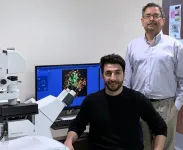INFORMATION:
The study was supported by the Dartmouth College Department of Education. This story appears online at https://today.duke.edu/2021/03/lab-studies-emotion-and-well-being-may-be-missing-real-world-anxiety.
CITATION: "Anxiety, Not Regulation Tendency, Predicts How Individuals Regulate In The Laboratory: An Exploratory Comparison Of Self-Report And Psychophysiology," Daisy A. Burr, Rachel G. Pizzie & David J.M. Kraemer. PLOS One, March 12, 2021, DOI: 10.1371/journal.pone.0247246
Lab studies of emotion and well-being may be missing real-world anxiety
Test participants' natural level of anxiety may cloud findings of laboratory psychology studies
2021-03-15
(Press-News.org) DURHAM, N.C. - For decades, psychologists' study of emotional health and well-being has involved contrived laboratory experiments and self-report questionnaires to understand the emotional experiences and strategies study participants use to manage stress.
But those hundreds of studies may have taken for granted a pretty big complicating factor, argues a new study from Duke University and Dartmouth College.
The study, which appears March 12 in PLOS One, says the background level of anxiety a person normally experiences may interfere with how they behave in the lab setting.
"The paper is not saying all of this work is wrong," emphasized first author Daisy Burr, a graduate student in psychology and neuroscience at Duke. "It's just saying, 'Hey, there's this really interesting unknown here that we should all be examining.' "
Most of the research on emotional regulation has focused on two strategies: Reappraisal and suppression. People who are naturally more anxious tend toward suppressing these feelings or pretending them away, "but that's kind of a surface-level technique that's not going to have any long-term impact," Burr said.
The reappraisal tactic has people face the stressor and try to change what it means to them - overcoming their fears - and that tends to be a little more long-lasting, she said.
Indeed, prior research finds that people who employ reappraisal more often are less anxious and depressed, Burr said.
Psychologists care about emotion regulation because it helps keep us all sane and on track.
"Emotion regulation is a buffer against the really negative effects that stress can have on your life," Burr said. "Stress is always going to be there, but it doesn't have to ruin your life."
Burr wondered how anxiety influences the way people naturally tend to regulate their emotions.
She and two colleagues taught Dartmouth undergraduates how to suppress or reappraise an emotional stimulus, and then put them through a standardized emotional regulation training protocol that has been used in hundreds of studies. For each set of stimuli, the participants were instructed to actively suppress or reappraise their response or simply to look at it without receiving any instruction.
As participants went through this set of stimuli, the researchers measured three physiological responses: Skin conductance (a measure of stress used in the polygraph test) and two sensors for the activity of specific facial muscles.
The three measures were then combined to create a "signature" for each test participant that captured when they were suppressing, reappraising or naturally engaging without instruction.
Researchers then compared response signatures for all 52 participants and found in the uninstructed situation where they weren't told how to cope, people who were naturally more anxious were more likely to suppress. Those who were less anxious tended toward reappraisal.
While that all fits with what the research would predict, they also found that anxiety, not self-reported regulation strategies, predicted how participants were regulating.
"There's a disconnect between how people are self-reporting their emotion regulation and how they're regulating in the lab," Burr said. "A person's anxiety may be this more fundamental process or disposition that kind of overrides how you regulate, at least in unrealistic environments, such as in the lab," Burr said.
And if that's true, Burr said future research should explore this disconnect to better understand the right way to rely on self-report measures and how to realistically study emotion -- inside and outside the lab.
"This is really a puzzle," Burr said. "It could be that people are not self-reporting their true regulation styles, or it could be that how people are regulating in the lab isn't mapping on to how they're regulating in the real world."
Part of the answer to this problem entails finding study methods that get out of the lab, which Burr and her Duke Ph.D. adviser Gregory Samanez-Larkin have already done.
They used text messaging during different times of the day to reach study participants where they are and assess their emotions in that moment. As a bonus, they can use these tools to study people outside the traditional demographics of lab studies: Undergraduate students who were enticed to the lab by coffee cards or extra credits in Psych 101.
Either way, more research is going to be needed. The paper has been shared as a pre-print since January and Burr said the feedback from her peers has been positive so far.
ELSE PRESS RELEASES FROM THIS DATE:
Community-based study links skin rashes to COVID-19
2021-03-15
Previous studies conducted in hospitals reported that COVID-19 patients presented with unusual skin rashes. This study, which is published in the British Journal of Dermatology, analyzed information provided by 336,847 individuals in the community who used the COVID Symptom Study app.
Skin rashes were more common in adults with a positive COVID-19 test result than in those who tested negative. Strikingly, among respondents of an online survey, 17% of SARS-CoV-2-positive cases reported skin rashes as the first presentation, and 21% as the only COVID-19 clinical sign.
Together with the British Association of Dermatologists, the study's investigators compiled a catalogue of images of the most common skin ...
There might be many planets with water-rich atmospheres
2021-03-15
An atmosphere is what makes life on Earth's surface possible, regulating our climate and sheltering us from damaging cosmic rays. But although telescopes have counted a growing number of rocky planets, scientists had thought most of their atmospheres long lost.
However, a new study by University of Chicago and Stanford University researchers suggests a mechanism whereby these planets could not only develop atmospheres full of water vapor, but keep them for long stretches. Published March 15 in the Astrophysical Journal Letters, the research expands our picture of planetary formation and could help direct the search for habitable worlds in other star systems.
"Our model is saying that these ...
Households in Zimbabwe affected by fall armyworm are 12% more likely to experience hunger
2021-03-15
CABI has led the first study to explore the income and food security effects of the fall armyworm invasion on a country - revealing that in Zimbabwe smallholder maize-growing households blighted by the pest are 12% more likely to experience hunger.
Dr Justice Tambo, lead researcher of the study published in Food and Energy Security, sought to investigate the impact of the fall armyworm (Spodoptera frugiperda) on household income and food security as well as the extent to which a control strategy can help mitigate the negative impacts of the pest.
He, along with CABI colleagues from its centres in Kenya and Zambia as well as in collaboration with Zimbabwe's Ministry of Lands, Agriculture, Water and Rural Settlement, also found ...
Global river flow contingent upon climate change
2021-03-15
More often than ever before, water available in rivers is at the mercy of climate change, international researchers collaborating on a worldwide study with Michigan State University have revealed. The finding could profoundly affect future water and food security around the world.
Yadu Pokhrel, associate professor of civil and environmental engineering in the MSU College of Engineering and a co-author of the study, said climate is the key driver in the current changes to global river flow.
"It's a noteworthy finding because as climate change impacts extreme flows, it could be worsening flooding or increasing water scarcity during dry seasons," Pokhrel explained.
Details of the new ...
Whispers from the dark side: What can gravitational waves reveal about dark matter?
2021-03-15
The NANOGrav Collaboration recently captured the first signs of very low-frequency gravitational waves. Prof. Pedro Schwaller and Wolfram Ratzinger analyzed the data and, in particular, considered the possibility of whether this may point towards new physics beyond the Standard Model. In an article published in the journal SciPost Physics, they report that the signal is consistent with both a phase transition in the early universe and the presence of a field of extremely light axion-like particles (ALPs). The latter are considered as promising candidates for dark matter.
Gravitational waves open a window into ...
Insulin rises before cells develop resistance, new diabetes research implies
2021-03-15
Researchers at the University of Gothenburg, Sweden, have now presented results that may change our basic view of how type 2 diabetes occurs. Their study indicates that free fatty acids (FFAs) in the blood trigger insulin release even at a normal blood-sugar level, without an overt uncompensated insulin resistance in fat cells. What is more, the researchers demonstrate the connection with obesity: the amount of FFAs largely depends on how many extra kilos of adipose tissue a person carries, but also on how the body adapt to the increased adiposity.
Worldwide, extensive research is underway to clarify exactly what happens in the body as type 2 diabetes progresses, and why obesity is such a huge risk factor for the disease. For almost 50 years, ...
UIC researchers discover hidden link between cellular defense systems
2021-03-15
Researchers at the University of Illinois Chicago have discovered that heparanase, HPSE, a poorly understood protein, is a key regulator of cells' innate defense mechanisms.
Innate defense responses are programmed cellular mechanisms that are triggered by various danger signals, which have been conserved in many species throughout evolution. These systems can be set into action by pathogens, such as viruses, bacteria and parasites, as well as by environmental toxins and dysfunctional cells that can accumulate in the body over time. A more thorough understanding ...
Study: Men of color avoid public places out of fear of involvement with criminal justice agents
2021-03-15
The U.S. criminal legal system has expanded at a rapid pace, even as crime rates have declined since the 1990s. As a result, individuals' interactions with and surveillance by law enforcement are now commonplace. But citizens experience different interactions, with people of color who live in impoverished urban communities having the most frequent encounters. A new study interviewed young Philadelphia men to determine their perceptions of and reactions to this phenomenon. Nearly all of the men of color said they stayed at home and avoided public spaces out of concern over the potential interactions with others that might draw police ...
Masonic Medical Research Institute develops new technology for studying brown fat
2021-03-15
UTICA, NY -- Brown fat, also known as brown adipose tissue (BAT), is a special type of fat that helps maintain body temperature. Importantly, brown fat is a biological fuel linked to metabolic rate and fat storage. In a recent publication, Dr. Zhiqiang Lin, Assistant Professor at the Masonic Medical Research Institute (MMRI) and senior author of the manuscript, successfully developed a new way to enrich isolation of brown fat cells for use in his biochemistry studies. "When faced with a scientific setback, we simply start tackling potential hurdles," said Dr. Lin. One of these was having a need to develop a better way to isolate these fat cells.
BAT is comprised of multiple cell types, which makes it difficult to ...
Study: Seattle's minimum wage increase did not change crime or employment rates
2021-03-15
Between 2015 and 2017, Seattle, Washington, became the first U.S. city to increase its hourly minimum wage to $15, more than double the federal minimum wage and 60 percent higher than Seattle's previous minimum wage. A new study examined the impact of this change on public safety. The study was motivated by the idea that since crime is sometimes the result of material deprivation, changes in the minimum wage might have implications for criminal activity: Boosting the minimum wage could raise workers' salaries (which could be associated with reduced crime). But if higher minimum wages spur employers to substitute capital for labor, this could ...
LAST 30 PRESS RELEASES:
The world’s largest brain research prize awarded for groundbreaking discoveries on how we sense touch and pain
Magnetofluids help to overcome challenges in left atrial appendage occlusion
Brain-clearing cells offer clues to slowing Alzheimer’s disease progression
mRNA therapy restores fertility in genetically infertile mice
Cloaked stem cells evade immune rejection in mice, pointing to a potential universal donor cell line
Growth in telemedicine has not improved mental health care access in rural areas, study finds
Pitt scientists engineer “living eye drop” to support corneal healing
Outcomes of older adults with advanced cancer who prefer quality of life vs prolonging survival
Lower music volume levels in fitness class and perceived exercise intensity
Of crocodiles, counting and conferences
AERA announces 2026 award winners in education research
Saving two lives with one fruit drop
Photonic chips advance real-time learning in spiking neural systems
Share of migratory wild animal species with declining populations despite UN treaty protections worsens from 44% to 49% in two years; 24% face extinction, up 2%
One in 20 babies experiences physical abuse, global review finds
Tundra tongue: The science behind a very cold mistake
Targeting a dangerous gut infection
Scientists successfully harvest chickpeas from “moon dirt”
Teen aggression a warning sign for faster aging later in life
Study confirms food fortification is highly cost-effective in fighting hidden hunger across 63 countries
Special issue elevates disease ecology in marine management
A kaleidoscope of cosmic collisions: the new catalogue of gravitational signals from LIGO, Virgo and KAGRA
New catalog more than doubles the number of gravitational-wave detections made by LIGO, Virgo, and KAGRA observatories
Antifibrotic drug shows promise for premature ovarian insufficiency
Altered copper metabolism is a crucial factor in inflammatory bone diseases
Real-time imaging of microplastics in the body improves understanding of health risks
Reconstructing the world’s ant diversity in 3D
UMD entomologist helps bring the world’s ant diversity to life in 3D imagery
ESA’s Mars orbiters watch solar superstorm hit the Red Planet
The secret lives of catalysts: How microscopic networks power reactions
[Press-News.org] Lab studies of emotion and well-being may be missing real-world anxietyTest participants' natural level of anxiety may cloud findings of laboratory psychology studies




